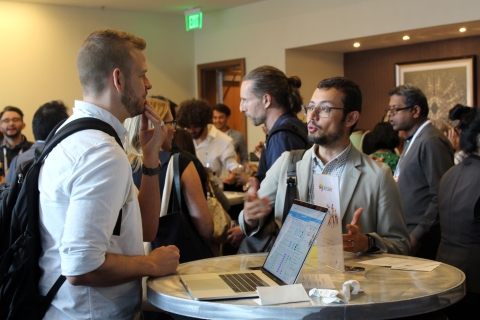
While online comments aren’t always known for civility, a digital men’s magazine in Brazil has used its comments section to build a thriving and supportive community that improves readers’ lives. Now, thanks to help from ICFJ Knight Fellow Pedro Burgos, the news outlet has the numbers to prove it.
Burgos analyzed 12 years of reader comments to examine Sao Paulo-based PapodeHomem’s impact on its community. The analysis identified at least 850 times that a reader said the site helped them, or even changed their lives.
“Here I learned about relationships, masculinity, finances, health and well-being and many other subjects that helped me to grow up,” one user wrote. “Thanks to this community I am a better man, no doubt about it.”
Burgos analyzed the comments using Impacto, a platform he built with support from the Google News Initiative and further developed as an ICFJ Knight Fellow. Impacto uses automation to find instances of how journalism creates positive change. Through his fellowship, Burgos is pioneering new ways for news media to build trust among their audiences by showing the impact good journalism has on their lives and communities.
The site also shared the results with readers, which Burgos says is critical.
“We think that if newsrooms get better at collecting their impact, and communicating it to their audiences, it will strengthen trust in media and make a better case for why people should support journalism,” he said.
To analyze the magazine’s impact on readers, Burgos and developer Bernardo Vianna worked with the magazine’s staff to create a list of metrics that indicate behavior change and gratitude in response to articles. Then, Impacto searched 226,000 comments posted on PapodeHomem’s website for those indicators.
Nearly 20,000 comments, or one out of every 11, included a "thank you" or other expression of appreciation.
“Impacto is helping us to better understand and show the world our value,” PapodeHomem founder Guilherme Valadares said. He noted that working with Burgos helped his team build a structured way of quantifying the magazine’s impact, something that they did not have before. “Clicks and views don't tell us how much we're impacting readers’ lives.”
PapodeHomem helps build this sense of online community by inviting conversation and encouraging multiple viewpoints, Burgos wrote in a blog post. Writers participate in the comments sections, making sure that discussions stay respectful, even on hot-button issues such as LGBT perspectives on Brazil’s election.
The journalists themselves are active members of the community. Guilherme commented 9,453 times. “They don’t let a big comment go without a reply from the editors,” Burgos said. In his blog post analyzing the comments, he invited additional feedback. The post received dozens of additional testimonials.
PapodeHomem also plans to use the data on comments to attract advertisers who are interested in connecting with a positive community.
Pedro Burgos is an ICFJ Knight Fellow based in São Paulo, Brazil.